Key takeaways:
- Understanding personal challenges involves deep reflection on emotions and can turn obstacles into opportunities for growth.
- Implementing mindset shifts like reframing thoughts and embracing a growth mindset is crucial for overcoming challenges.
- Creating a personal action plan with clear goals and reflecting on past successes enhances problem-solving abilities and fosters resilience.
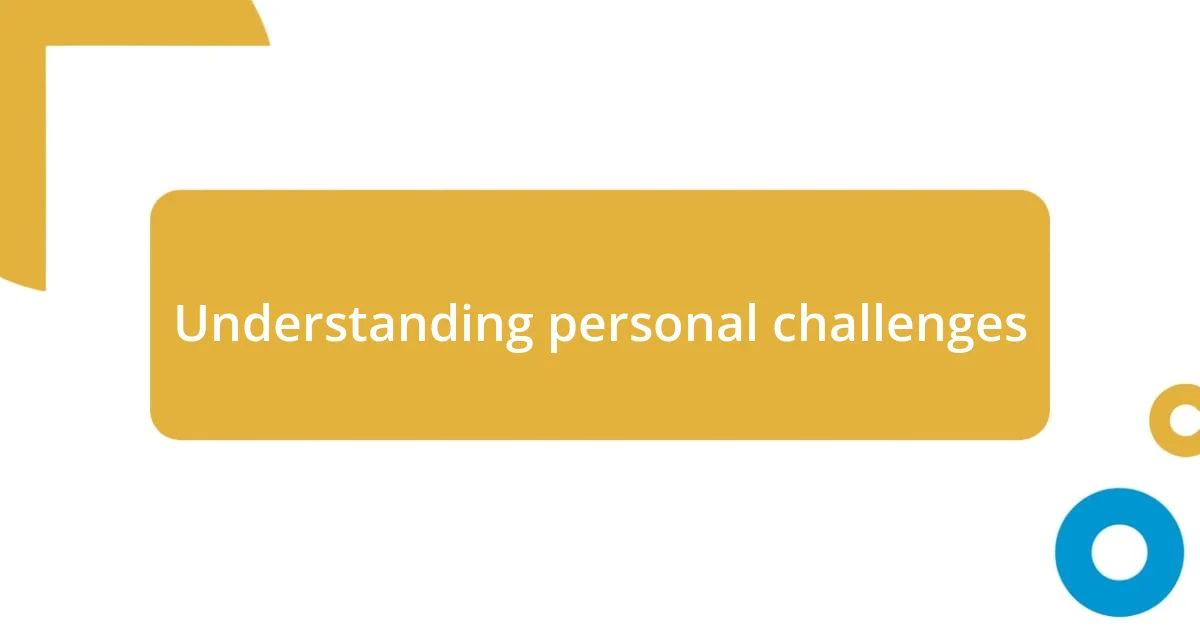
Understanding personal challenges
Understanding personal challenges often requires a deep dive into our emotions and motivations. I remember a time when I faced a significant setback at work, and I felt completely overwhelmed. It makes me wonder: how do we truly gauge the weight of our own struggles?
Reflecting on personal challenges can be both enlightening and isolating. I once found myself battling self-doubt after a failed project, and in that moment, it felt as if I was the only one facing such intense feelings. It’s curious, isn’t it, how challenges can sometimes create a sense of loneliness despite the fact that everyone experiences struggles?
As I navigated through these feelings, I began to realize that understanding my personal challenges was the key to overcoming them. Each obstacle presented an opportunity for growth, and I asked myself how I could transform these hurdles into stepping stones. Isn’t it fascinating how our perception of challenges can shift dramatically once we start looking for the lessons hidden within them?
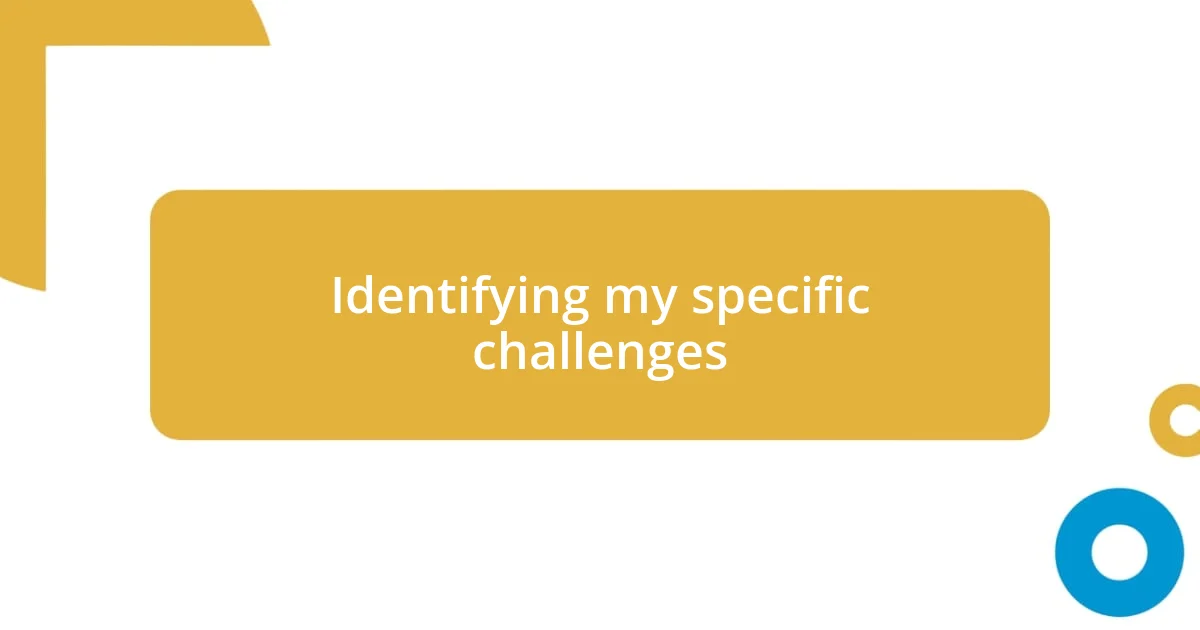
Identifying my specific challenges
Identifying my specific challenges has always been a bit of a journey for me. I recall a time when I was juggling multiple responsibilities, and I couldn’t pinpoint which task was causing my stress. It was only through journaling my thoughts and feelings that I began to see patterns in my overwhelm. Understanding that my time management habit needed tweaking helped me take the first step towards improvement.
To truly differentiate between my challenges, I’ve developed a simple list that helps me focus:
- Fear of failure: This often looms over me, especially in new projects.
- Procrastination: It’s easy to push things aside until the last minute.
- Lack of assertiveness: I sometimes struggle to voice my needs, which complicates my relationships.
- Overcommitment: I tend to say “yes” too often without considering my limits.
By reflecting on these points, I gain clarity and can address the specific hurdles I face rather than getting lost in a sea of generalized anxiety.
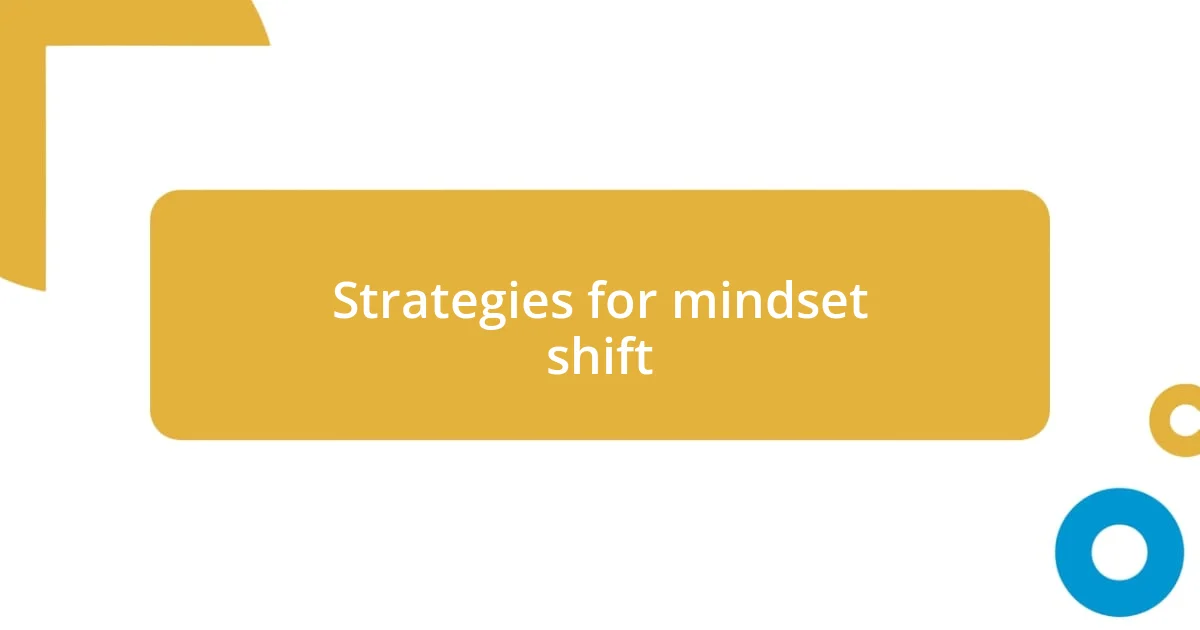
Strategies for mindset shift
Shifting my mindset has been essential in overcoming challenges. I find that sometimes, simply reframing my thoughts can make all the difference. For instance, when I approach a daunting task, rather than thinking, “I have to do this,” I remind myself, “I get to do this!” This small tweak shifts my perspective from feeling burdened to feeling empowered, allowing a sense of gratitude to seep in.
Another strategy that has worked wonders for me is embracing a growth mindset. I vividly remember a moment when I received critical feedback on my work. Initially, it felt like a punch to the gut, but then I decided to view it as a chance to learn, grow, and improve. Asking myself, “What can I learn from this feedback?” turned the experience into a powerful opportunity, inspiring me to push my boundaries further.
Lastly, surrounding myself with positive influences has played a key role in my mindset shifts. I’ve seen how the attitudes of those around me can significantly impact my outlook. When friends or colleagues express support or optimism, it tends to rub off on me. I urge you to evaluate your social circles; after all, is there a better way to uplift your mindset than by being around those who inspire and motivate you?
| Mindset Strategy | Description |
|---|---|
| Reframing Thoughts | Changing negative phrasing to positive intentions, such as “I get to do this” enhances motivation. |
| Embracing a Growth Mindset | Viewing challenges and feedback as opportunities for learning and improvement fosters resilience. |
| Surrounding with Positivity | Building relationships with supportive individuals can elevate one’s mindset and challenge responses. |
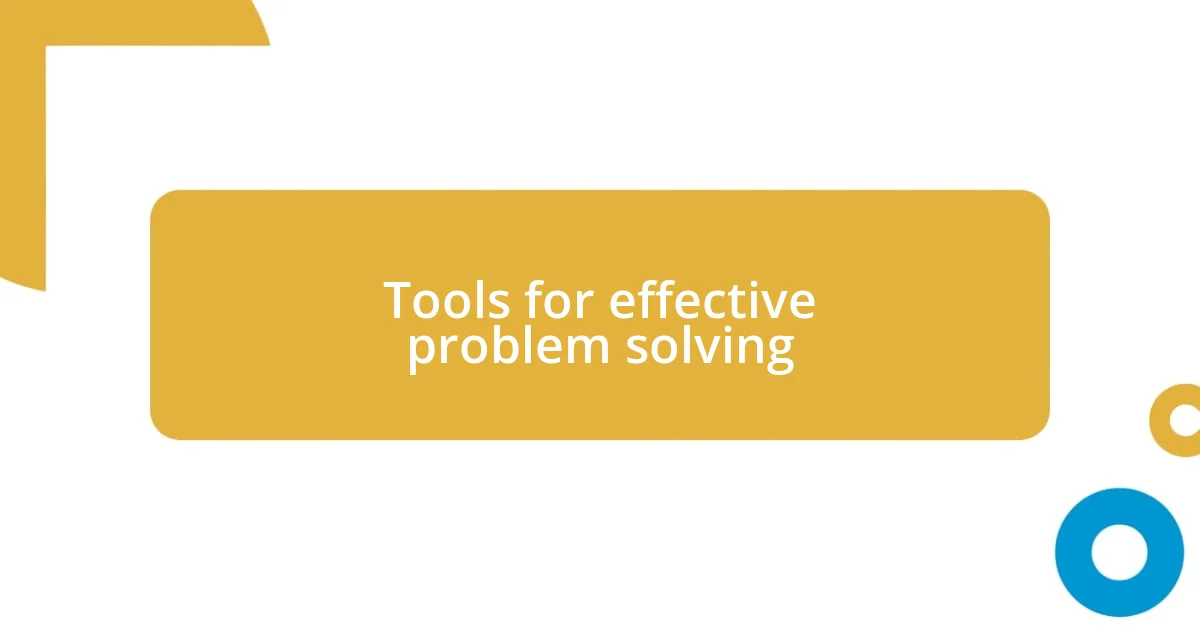
Tools for effective problem solving
I’ve found that one of the most effective tools for problem-solving is creating a clear action plan. When I faced a particularly overwhelming project, I took a step back and broke it down into smaller tasks. It felt like pulling apart a complex puzzle. By focusing on one piece at a time, I not only eliminated the stress of the whole picture but also celebrated my small wins along the way. Have you ever noticed how achieving minor goals can motivate you for bigger challenges?
Mind mapping has also been a game changer for me. I remember sitting with a blank sheet of paper, doodling ideas related to a project I was stuck on. The visualization transformed my thoughts from chaotic to coherent, allowing me to see connections I hadn’t noticed before. Sometimes, just letting your thoughts flow freely can surface solutions that seem buried under layers of stress. What if you tried mapping out your thoughts next time you hit a roadblock?
Additionally, feedback loops have proven invaluable in my problem-solving toolkit. After presenting a new idea, I made it a habit to invite constructive criticism. This practice not only provided me with diverse perspectives but also opened doors to brainstorming potential solutions. I still recall how one colleague’s suggestion turned a weak concept into a winning proposal. It’s a reminder that collaboration often leads to more comprehensive solutions than we can devise alone. When was the last time you sought feedback?
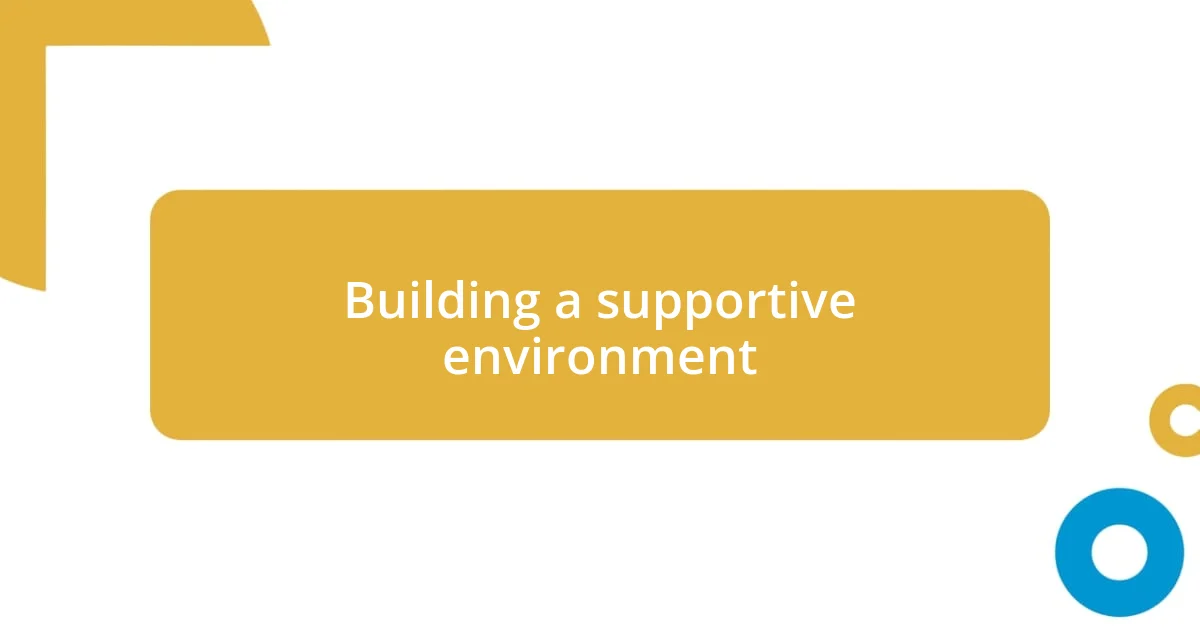
Building a supportive environment
Building a supportive environment is essential to navigating life’s challenges. I remember when I was feeling overwhelmed at work; I made a conscious decision to share my struggles with a close friend. Just talking about my feelings provided me with clarity and comfort. Have you ever noticed how powerful simply vocalizing your worries can be? It not only lightens the load but also opens up avenues for support you might not have even considered.
Creating a network of encouragement can be as simple as joining a group committed to mutual growth. I joined a local book club that discussed not just the literature but also our personal journeys and challenges. The shared experiences fostered a sense of connection and reminded me that I wasn’t alone in facing obstacles. This collective environment significantly uplifted my spirit. Have you thought about tapping into local resources for support? You might be surprised by how many people are eager to share and support.
Lastly, I’ve learned the importance of expressing gratitude within this supportive framework. After receiving help from my community during a tough period, I took the time to write thank-you notes to those who stood by me. Not only did this strengthen our relationships, but it also deepened my motivation to give back. What a fulfilling cycle it is to receive and then uplift others! When we actively nurture our connections, we create a robust net of support that catches us in our most vulnerable moments.
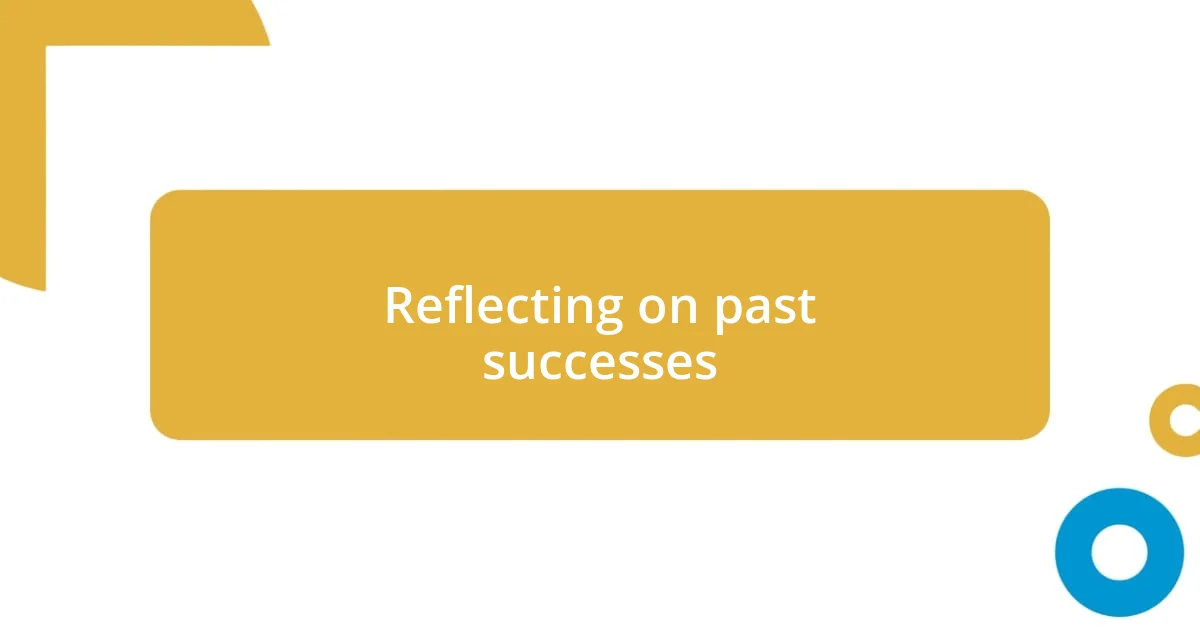
Reflecting on past successes
Reflecting on past successes can often feel like flipping through the pages of a cherished scrapbook. I distinctly remember a time when I completed a challenging project ahead of schedule, despite my initial doubts. Revisiting those moments of triumph helps reinforce my confidence for future challenges. Have you ever paused to think about what you’ve accomplished, even when it seemed overwhelming?
What stands out to me is how I used to make a list of past achievements whenever I faced self-doubt. One day, after a particularly tough week, I scribbled down everything I had achieved in the last year, from minor tasks to significant milestones. Seeing those items visually laid out was like having a personal pep talk—each success served as a stepping stone, reminding me that I could tackle the next hill. It begs the question, how often do you give yourself the credit you deserve?
Looking back, I realize that those successes often illuminate the strengths I didn’t know I had. For instance, when I successfully led a team through a complex product launch, it wasn’t just about hitting our targets. It was about the relationships we built and the lessons learned in resilience and teamwork. Reflecting on these experiences not only fuels my motivation but also provides valuable insights into my personal growth journey. Don’t you think our past wins hold the keys to unlocking future potential?
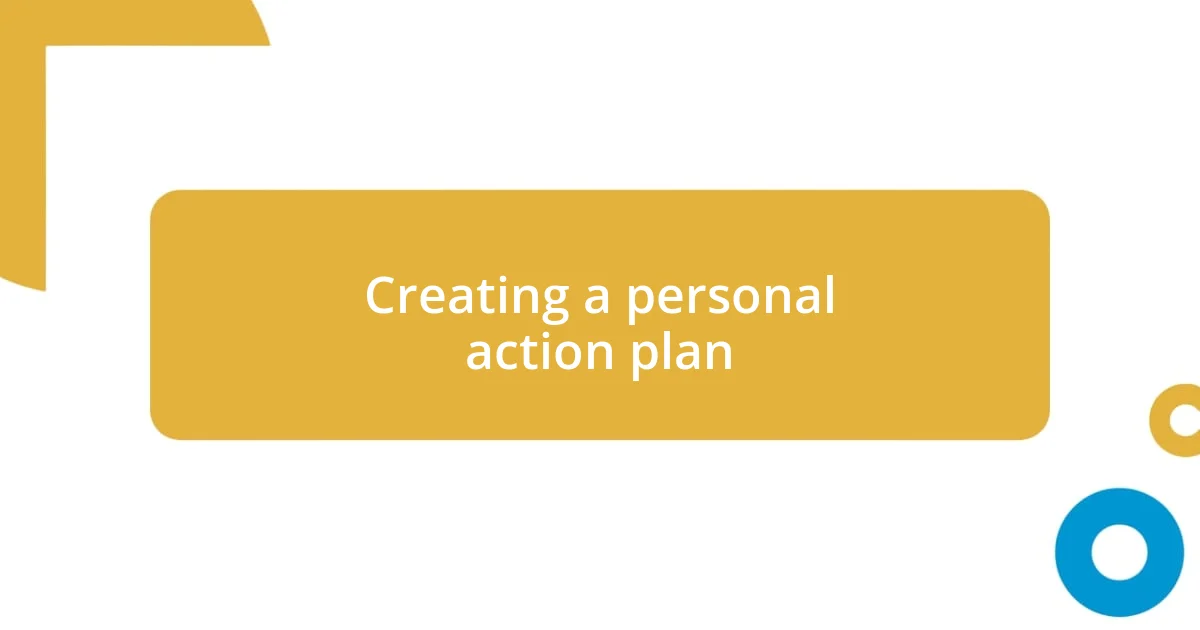
Creating a personal action plan
Creating a personal action plan starts with identifying the specific challenges you face. I once found myself struggling with time management during a hectic semester at school; I began by writing down the key areas where I felt overwhelmed. This simple act helped me break things down into manageable pieces and prioritized what really mattered. Have you ever tried mapping out your hurdles? You might be surprised at how clarity can turn your chaos into a clear pathway forward.
Next, I discovered the power of setting realistic goals. When I was preparing for an important certification exam, I opted for bite-sized targets over vague ambitions. Rather than saying, “I’ll study every day,” I specified that I’d tackle one chapter each evening. This approach gave me a sense of accomplishment and kept the momentum going. What small victories could you celebrate in your own action plan? It’s amazing how tiny steps can lead to monumental achievements.
Lastly, I learned the invaluable role of reflection in this process. After implementing my action plan for a personal fitness journey, I made it a point to journal my progress weekly. Each entry was a powerful reminder of how far I had come, even on days when motivation waned. Don’t you think reflecting on your journey can provide profound insights? It not only helps adjust your plan but also celebrates persistence and growth along the way.














